At Long Last, Love and Fulfilment in David, Panamá
As we learn from Robert Reichert’s story, the dreams you never release will find you, and the practice of doing your best will richly reward you. Jet Metier discovers what motivates one of Best Places’ most generous contributors and how collaborating with his Panamanian wife Eneida was the most satisfying aspects of making a home in David, Panama, for follow Canadians, and for himself.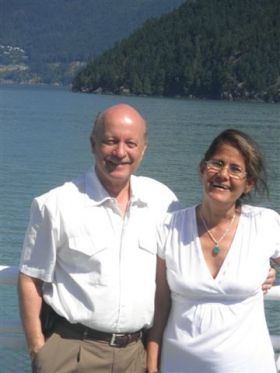

Jet Metier: Hi there, Bob. I am glad we are finally getting to chat. You have such a wonderful picture on your profile page. Who is that lovely woman with you and where are you with the water behind you?
Robert Reichert: That is my wife Eneida and we are on a ferry, crossing Horseshoe Bay from Vancouver going to Gibson Landing for my daughter's wedding in August 2011.
Jet Metier: You look so happy together.
Bob you are going to be my Canadian-Panamanian cross-cultural attaché. I would like to ask you questions about living in David and in Panama from a Canadian's point of view. What are your reflections on why Canadians are moving to Panama?
Robert Reichert: For the most part, I believe they move here to escape the long, cold winters in Canada. The second reason may be to lower their cost of retirement.
By the way, Eneida is Panamanian-Canadian. She received her Canadian citizenship while she spent 12 years in Canada and then returned to David (her home town). I met her here in David and we were married about 4 years later.
She said, "I didn't find my Canadian when I was in Canada and had to come back to Panama to find him!"
Jet Metier: That is quite a story of fate..jpg)
.jpg)
Bob, I do not know anything about how Canadians prepare for retirement. We have Social Security in the US. We have "adult communities." Do Canadians have paths they follow besides retiring overseas?
Robert Reichert: Yes, they do. In Canada, there are basically three kinds of retirement pensions; CPP (Canada Pension Plan), which is a money purchase plan contributed to by employees and employers; Old Age Security, a government pension payable at age 65; and private corporate pensions, generally based on years of service with your employer.
When people retire, mostly at 65, they tend to a) live where they have been; b) move to a smaller community or a warmer place in Canada (move from the prairies to B.C. [British Columbia] or the east coast); or, c) go south to places like Yuma, AZ, Myrtle Beach, Florida for the winter, or in some cases Mexico or Central America. The North American destinations are generally shorter term (6 months or less) and the Central America visits tend to be longer or permanent.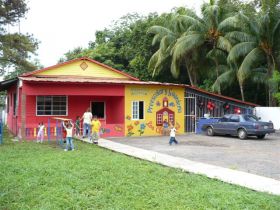

Jet Metier: Why do they stay for a shorter term in North America as opposed to in Central America?
Robert Reichert: I suppose it is a different mindset. I think when people come here to Central America, they have generally have made up their minds to “live abroad.” They often do not retain their permanent resident status in Canada and have crossed the hurdle of trying to retain their medical coverage, etc. They are generally folks with less family ties back home.
Jet Metier: Here in the US, we have historical connections to Panama; namely, the Canal. What kind of ties do Canadians have to Panama, or to cause Panama to come to mind when thinking of their next home abroad?
Robert Reichert: To be honest, I have found that Panama is NOT yet really on the radar of Canadians. They often come to Panama without knowing too much about it. Most Canadians (as I think Americans) are much more aware of Mexico and Costa Rica. They probably all know about the Panama Canal, but little else. But Canadians tend to be quite adventurous and look for something new. They hear about Panama by word of mouth, from a friend who has been here or just stumble across it on the web.
The ties between Panama and the USA are certainly different than they are between Panama and Canada. Canada has been developing stronger relations with Panama over the past few years and does a fair amount of aid here in the form of small business financing, etc., but actual trade with Panama is only just beginning, I think..jpg)
.jpg)
On the other hand, Panamanians have a soft spot for Canada, probably because many refugees (if one can use that term) found Canada to be a friendly place when they were trying to get away from Noriega. That was Eneida's reason for going to Canada; she felt her odds of being allowed to stay there where better than in the USA.
Jet Metier: I appreciate your thoughtful answers, Bob.
On the site, there is rarely any talk of Noriega’s time, or it is hastily described as "the military period" or something similar. Please tell us about Eneida's experience that forced her to immigrate to Canada.
Robert Reichert: She was separated and had a daughter. Things got very strange here under Noriega. Bank accounts were frozen, many people and businesses disappeared or were taken over, there was unrest in the streets of Panama City and the more rural areas were not being supported in any way. Everything was corrupt and no one really knew who to trust because of citizen groups (akin to the Brownshirts in Germany under Hitler), reporting on the public. She was basically afraid for the future and made a very gutsy decision to go to Canada.
Eneida landed in Montreal and was placed with a group of immigrants and eventually granted asylum. She immediately realized she needed to learn English to survive and got into classes. After about a year she moved to Toronto because she did not want to be immersed in a French culture. She learned enough English to get work (under the table work at the beginning) and made ends meet. Eventually she was granted papers to work legally, continued in school to learn a vocation and after eight years acquired her Canadian citizenship. What a wonderful world we live in!
Jet Metier: Why did she not want to be immersed in French culture?
Robert Reichert: Because she wanted to learn to speak and work in English, not a French environment. I should also say that Eneida had a nine year old daughter and she wanted to ensure that her daughter was in an English-speaking place. Panamanians understand that those who speak English are the ones who can get ahead.
Jet Metier: What about the other Panamanians who went to Canada? Did they stay in Canada or did they go back to Panama? How about the second generation born in Canada? Do they consider themselves Canadian first?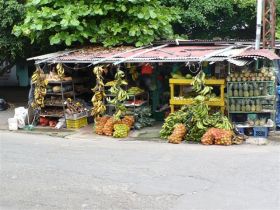

Robert Reichert: I think many of the Panamanians have returned to Panama. They love their country. They also found the cold difficult. Eneida often comments about working in an office where the a/c is on and the snow has just barely melted. She did not like that at all!
Eneida's daughter is back in Canada. She studied there and all her friends are there, so after spending a short time back in Panama, she decided to return to Toronto where she lives today.
Jet Metier: I have very positive impression of Canada and Canadians. We visited Montreal and Quebec and met the nicest people. The cities and towns were just charming. Now that you live in Panama and particularly in the city of David, when you drive around or conduct business or just make observations generally, have Canadians made contributions which you feel are Canadian in nature to their newly adopted country? Can you give me specifics that are contrasting?
Robert Reichert: This is hard to answer. We don't have a very large concentration of Canadians in the David area. The ones I know about are scattered. What I can say is that from my observations, they are all active and enterprising. We built condos; a friend has started a project near the Costa Rican border, another has built a six-plex near a beach. They have small businesses. Anyone I deal with “likes” dealing with Canadians because they are honest and do what they say. As for “Canadian in nature,” I am not sure I can give you any specific examples.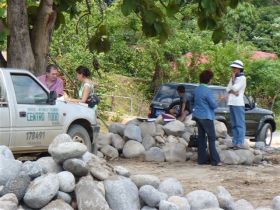

Jet Metier: Tell us about you, Bob. Where were you raised? What was your family like? What kind of goals did you have in your working life? What are your favorite accomplishments before you moved overseas?
Robert Reichert: I was raised in a small town in southern Manitoba. I left home to go to Winnipeg where I started my career. I almost became a graphic artist and had aspirations of being an architect. But the real world got in the way and I spent most of my life in the gases and welding supplies distribution business. My goal was to be an independent businessman.
I am a starter/builder and have been involved in about a dozen start-ups or takeovers. My biggest thrill during my working life was to give advancement opportunities to up and comers.
When I came to Panama and looked at what to do next, the thought of retirees moving to a warm climate and needing a place to settle was the push behind building condos in David. With a Canadian partner in Winnipeg, we built two projects in David and sold the majority of the units to Canadians..jpg)
.jpg)
Jet Metier: Please tell me about the early projects you had. You mentioned that you wanted to be an architect. How did you lend your personal vision to the first units? It must have been thrilling for you.
Robert Reichert: I suppose in a way, building condos let me act out an old desire to be an architect. After finding a building site, I did the design for the first project. We were not sure of the market or exactly what people were looking for, but proceeded with something that I would buy if I was moving here. These were modest but comfortable and the plan was to market them with a web-site.
My partner hired a graphic artist and a web designer and we proceeded. Before we knew it, sales were being made. To our amazement, most of the buyers had never even visited Panama. We could hardly believe it.
During construction, one night after the walls were up and the roofs were on, Eneida and I were standing on the site after dark and I knew that we had created exactly what was in my mind’s eye when the plans we being drawn. That was a very gratifying moment.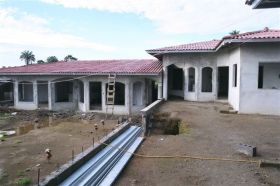

Jet Metier: You said you were designing for yourself. What features appealed to you that ended up appealing to your buyers?
All the condos were built around an 'open floor plan' for the living room, dining and kitchen area. This included a vaulted ceiling and an island kitchen. One could cook (something I love to do) and enjoy friends or family at the same time. That was a very important feature for me.
Outdoor living was another feature made possible with large covered patios (something I expanded in the second phase) as well as built-in features like laundry areas, that allowed for more efficient use of the inside space. We have generous en-suites also.
One other thing, the plan was for 'cottage style' units, that is, all on the main floor. No second floors anywhere.
Jet Metier: This sounds like a home I would love, too. And I suppose when you get older, a second story is not that practical.
How did you adapt the condos for living in hot Panama?
Robert Reichert: They all have ceiling fans in the principle rooms, air conditioning in the living and bedroom areas, tinted glass windows, and in the second phase we used insulated, cement covered panels for all the walls and roof slab.
Jet Metier: Why did you choose David over Boquete, Panama City, Coronado or even Pedasi?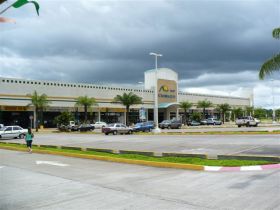

Robert Reichert: I like David and wanted the convenience of living in a city. I came here to get away from the cold. After driving to Central America from Vancouver, I had the opportunity to pass through the major centers of every country except Belize, and David is the nicest small city anywhere in Central America. Besides, my first visit to David, one month before I moved here from Nicaragua, impressed me and when I returned to Panama a month later and got to David again, it felt like I had come home. So this is where I stayed.
Jet Metier: Please describe why David is the nicest small city in Central America. And how did you communicate this to your future buyers who had no experience at all of Panama?
Robert Reichert: Well, I could write a book about this question. The website had a lot of info about David and Panama, lots of pictures of the city, building, parks, etc. We provide a mountain of “how to” info, like opening a bank account, medical coverage, getting a driver’s license, applying for a permanent residency visa, etc. We had newsletters to prospective buyers, artist’s renderings, construction photos, site plans and detailed descriptions. We communicated with prospects in thousands of emails, hundreds for phone calls, testimonials from other buyers, tourism info, and on and on.
Jet Metier: What did they tell you as to why they bought into your development? And what was it about your website that gave them inducement to "come on down!"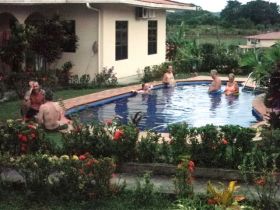

Robert Reichert: I talked to people and answered their questions from a first-hand perspective, because I had just recently done the trip, etc., and reminded people that I had to do this “all on my own” without a Panabob to talk to; but now they had ME!
These things work, you know it, and that is why you are doing your Best Places in the World to Retire website.
Most people bought from us because we had a good design, a friendly-looking environment, lots and lots of information, straight answers to their questions, and referrals, if they asked for them. AND, we were Canadians and people they believed they could trust. What more can I say....32 units later, it is done.
And by the way, we still have happy clients.
Jet Metier: Bob, I have heard quite complimentary things about you. What is your philosophy about giving, kindness, service, helpfulness and generosity? What is it rooted in? How do you practice it? Why are helping start-ups and up and comers the most satisfying for you?
Robert Reichert: I was raised by two salt of the earth parents, who unfortunately have both passed. But they believed in honesty and hard work. They came from a generation that didn't have anything handed to them; they earned it. So, with an older sister and a younger brother, we shared in the weekly chores, had our paper routes, cut grass in the school yard and knew the value of “enterprise.” I suppose in some ways, I take after my dad in the “kindness” department. He was always bringing home some poor old fellow who needed a meal or giving them a job even when none was really required; he would give you the shirt off his back. Mom too, was a doer and a helper, Girl Guides, 4-H teacher and a tireless contributor to the Women’s' Institute or any activity that helped young kids.
I learned early in my career that well-placed kindness and thoughtfulness came back in spades, when used correctly. If I had a chance to advance the career of someone, I did. I liked to see my subordinates or equals succeed. Maybe because I was confident enough in my career not to feel threatened. I rose through the ranks quickly, never failed to get a job I applied for and had some great times doing really interesting things.
Jet Metier: You know, I think you could be recruited for another development in another country, just by this interview, Bob!
How have you seen Panama through your wife's eyes, with her by your side? Eneida is obviously indispensable to your happiness. What makes your match flourish as you work and live together in Panama?.jpg)
.jpg)
Robert Reichert: Eneida grew up very poor, in a single parent home, with four siblings. Her mom died when she was only 14 and she had to work for everything she has ever had. She has been indispensable to our projects, getting through the red-tape and using her local knowledge to get us through the maze.
We have pretty similar interests and values so we don't have too may conflicts in these areas. If I know the value of a dollar, Eneida knows the value of a penny!
We both have a similar political outlook and care very much what happens to Panama. This has become my home, too, and we want the country and the people to prosper. We share the same views when it comes to changing the bad habits of the people, like being more concerned about littering and other bad habits. We are concerned that the cost of living is rising and are both hopeful that the newly elected president, Juan Carlos Varela will steer the country in the right direction.
And lastly, we hope that the arrival of foreign residents will benefit and not harm the country in the long run. We would like the expats to learn tolerance for the social and economic differences they find here and give back a little where they can in exchange for the great economic benefit most of them receive by being allowed to live in Panama..jpg)
.jpg)
Jet Metier: Thank-you so much for this interview, Bob. It was so wonderful to learn how you have given the best of yourself to your new home and that you are helping others discover the contentment you have.
My very best to Eneida. I wish you two continued happiness together. Thank-you again. Adios!
Robert Reichert: Saludos Jet, this was fun.
Jet Metier: You are very kind.


